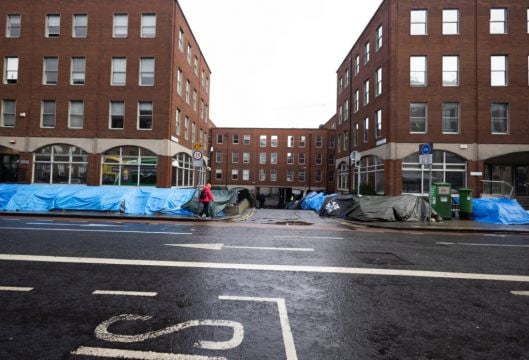An immigration lawyer has warned that cases will be taken by asylum seekers if Ireland attempts to return them to the UK while it is operating its planned Rwanda scheme.
It comes as the Cabinet approved emergency legislation from Minister of Justice Helen McEntee to allow the UK to be designated as a safe country to enable asylum seekers to be transferred back there.
A High Court ruling in March deemed that the legal basis for designating the UK as a safe country to “return” asylum seekers to was unsound under EU law.
The UK Government recently passed legislation for a scheme to deport some asylum seekers to Rwanda, which was announced two years ago but has yet to see a flight take off.
David Leonard, a barrister with expertise in immigration law, said the UK legislation for the proposal was “unprecedented territory”.
Responding to a question from Senator Michael McDowell at a parliamentary committee on Tuesday, Mr Leonard said: “That Act was passed to get around a judgment of the UK Supreme Court.
“It wouldn’t be a lawful act if it was passed by the Oireachtas over here because of our constitution, but it is interesting to see what will happen over there because they don’t have a written constitution and place a lot of weight on parliamentary sovereignty.
“I’d be slow to predict that Rwanda will actually go ahead.”
Asked what would happen in Irish courts if asylum seekers objected to being sent to the UK if the Rwanda proposals went ahead, Mr Leonard said the UK Supreme Court deemed that the previous proposal to send people to Rwanda was unlawful because it could lead to a breach of human rights.
He added: “Applicants – if they’re at risk of being sent to the UK and sent in a chain then on a flight to Rwanda from the UK – they could argue that Ireland couldn’t lawfully send them to the UK to expose them to that risk.
“So there will definitely be case law on that if Rwanda does go ahead and people are at risk of them from being sent from here to the UK.”

Maeve Anne Kenny from the Department of Justice’s migration policy team said the argument was “relatively premature” as the Rwanda policy had not been operationalised and there had been no ruling in the European Court.
The exchanges occurred at Tuesday’s sitting of the Joint Oireachtas Committee on Justice, which had invited migrants’ rights groups to discuss the EU Pact on Migration and Asylum.
Earlier this month, the European Parliament voted to approve the pact which includes measures such as the taking of fingerprints and facial imagery of children as young as six as well as restriction of migrants’ movements during screening.
It also includes measures on faster decision-making and the sharing of responsibility across member states which could see relocation of international protection applicants or the payment of financial contributions to the EU.
The Irish Refugee Council (IRC) said the proposals reflect an effort to limit protection for asylum seekers in Europe.
It said the pact, which the Government has signed up to, will result in fewer safeguards, increased detention and “destitution among people seeking protection”.
It said its largest concern was that people who arrive without documentation and those that have had to cross a border illegally will be detained or have their movement restricted.
Alan O’Leary from the IRC added: “In our experience, this will include applicants from countries with high rates of refugee declarations, including Afghanistan and Somalia, who often have no alternative other than to travel without passports or use substitute documents.
“People who arrive from countries with a recognition rate of 20% or less will also be subject to detention.
“They will also be channelled into an accelerated border procedure. This risks overlooking those who are most vulnerable and in need of protection, and whose cases often require legal advice and careful consideration.”
Mr O’Leary told the committee that the IRC began with good intentions but has been “gradually eroded by various member states’ hardening positions”.
“We are not opposed to harmonisation and common standards. If anything, however, we need compliance with the existing body of legislation rather than a continued need to reform,” he said.
A representative from the United Nations High Commissioner for Refugees (UNHCR) said the EU’s current systems have not been implemented in a way which has managed asylum for member states or delivered protection for refugees.
Enda O’Neill, head of office for UNHCR Ireland, told committee members: “Dangerous practices, such as denial of access to territory, pushbacks and the non-implementation of fair and efficient procedures and solidarity, cannot continue as they undermine a well-functioning EU asylum system.”
Mr O’Neill said while the UNHCR welcomes the agreement of the pact, legal reform is “merely the first step”.
He added that detention should be a last resort and focus should be placed on establishing a fair system with procedural safeguards.
However, the director of the Migrant Rights Centre warned that the proposals were “regressive”.
Edel McGinley said: “We cannot let a few bullies distract us, whip up fear and spread dangerous lies about those of us who are different because of where we come from. We cannot fall into this trap.
“These worrying proposals also extend to people living and working in Ireland long term. It means that people could be singled out on the street because they look different.
“It means people’s right to privacy and due process are under threat. The potential for harm to people and communities is immense.”
Migrants’ rights group Nasc also raised concerns about the timelines and accelerated border procedures under the pact.
Chief executive Fiona Hurley said: “We are concerned that procedural guarantees and protections for asylum seekers will be sacrificed for deterrence and creating efficiencies in processing.”







